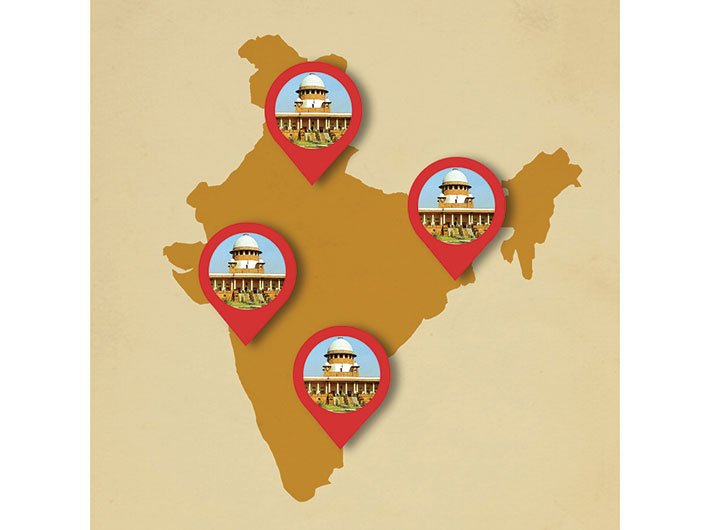It will kill two birds with one stone. Or rather three. It will not only reduce the number of pending cases with the apex court, which is 57,987 as of June 2018, but will also provide litigants from the southern, eastern and western parts of the country an easy access to the highest court. Moreover, it will help in de-congesting the national capital, which is already bursting at the seams, by distributing some of the finest minds into four different metros.
Imagine if you live in Tamil Nadu or Assam and want to challenge the judgment by the high court in your state. The only way to do that is to travel all the way to the national capital, which will include a hefty transportation cost, a burdensome lodging charge and obviously burn-a-hole-in-pocket lawyer fees. And if God forbid the case is adjourned, the cost will only escalate. But if there was a regional bench of the apex court in Chennai, then one could heave a sigh of relief.
Many law commission reports have suggested opening SC branches in metro cities to facilitate people from the far flung areas. The commission’s 229th report states: “We are today in dire search for solution for the unbearable load of arrears under which our Supreme Court is functioning as well as the unbearable cost of litigation for those living in far-flung areas of the country. The agonies of a litigant coming to New Delhi from distant places like Chennai, Thiruvananthapuram, Puducherry in the South, Gujarat, Maharashtra, Goa in the West, Assam or other States in the East to attend a case in the Supreme Court can be imagined; huge amount is spent on travel; bringing one’s own lawyer who has handled the matter in the High Court adds to the cost; adjournment becomes prohibitive; costs get multiplied.”
Think
It will ensure speedy delivery of justice by reducing the huge backlog of cases
. . .
It will make the supreme court accessible to people from far-flung areas
. . .
It will de-congest the national capital by distributing some of the finest minds into four different metros
In fact, article 130 of the constitution gives power to the chief justice of India, with the approval of the president, to open such branches. But every time the request has been made it has been turned down.
Having regional benches is not an unfeasible idea as many countries like Italy, Egypt, Portugal and Ireland have Court of Cassation (a court which can reverse decisions of the lower courts). Besides, already courts are hearing cases via video-conference. There is no reason why regional benches of the supreme court could be set up in the metros, with video-conferencing facilities to link them with the districts. A petition for a worthy cause will find the court arriving halfway to take it up. Accessibility-wise, what could be better than that?
The country can definitely take a cue from the international best practices and leave aside the legacy of having only one supreme authority. As they say, one should change with the changing times, the supreme court should also change for its own benefit and the benefit of the citizens.
Reality Check
There has been no concrete reason to not divide the supreme court, except that it has been a norm since the beginning and it will remain like this. In 2015, the apex court brushed aside a petition to open branches in other parts of the country. The then chief justice HL Dattu categorically said that the court had rejected such requests on the judicial side earlier. “There is already a precedent,” he said, adding, “No one can seek a mandamus for setting up of circuit benches of the Supreme Court. That will be like the CJI issuing notice to him. Article 130 can be used some other time. Not now.”
ridhima@governancenow.com
(The article appears in January 15, 2019 edition)

